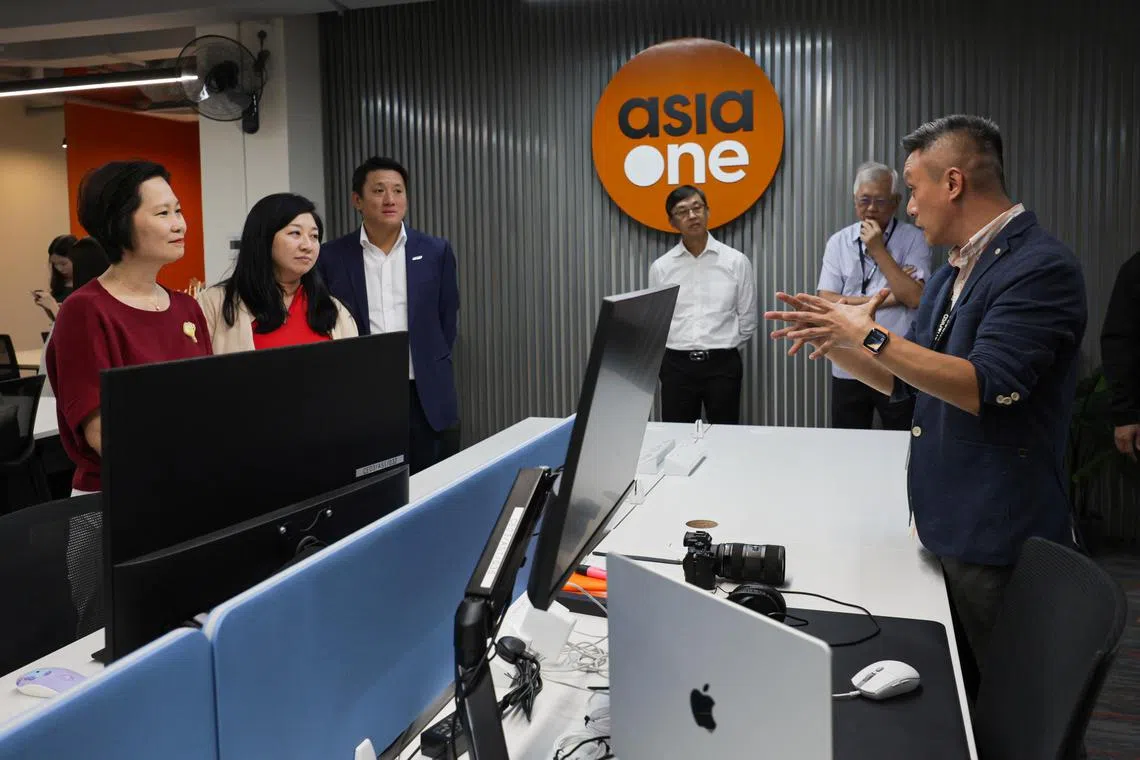Tripartite group studying flexible work arrangements, so firms can avoid losing out on talent
Sign up now: Get ST's newsletters delivered to your inbox

Minister of State for Manpower Gan Siow Huang (left) touring AsiaOne Online during her visit on Jan 31.
ST PHOTO: GIN TAY
SINGAPORE – Some bosses have reservations about implementing flexible work arrangements but fear they could lose out on attracting and retaining talented staff if they fail to do so.
Firms are especially focused on the issue as a tripartite work group is developing guidelines on flexible work arrangements that will be compulsory for employers to follow once they are implemented later in 2024.
Some employers are concerned about whether such work arrangements might affect productivity, particularly if certain types of work are not suitable to be done from home, said Minister of State for Manpower Gan Siow Huang on Jan 31.
Ms Gan made her remarks during a visit to news site AsiaOne Online, which has already started implementing flexible work arrangements. The 11-member work group developing the guidelines is jointly chaired by Ms Gan, Ms Yeo Wan Ling, director of the National Trades Union Congress’ women and family unit and its small and medium-sized enterprise unit, and Mr Edwin Ng, Singapore National Employers Federation’s honorary secretary.
“We see that there are opportunities for employers to be creative and also receptive to different types of flexible work arrangements,” Ms Gan noted.
“Some employers have told us that if the employees are willing to consider different forms of flexible work arrangements, they can reach good outcomes most of the time.”
Ms Yeo noted during the AsiaOne visit that surveys show that employees say flexible work arrangements let them work longer term at their jobs.
“Although productivity is a big concern for employers regarding flexible work arrangements, they stand to lose out if they don’t have such arrangements,” she added.
AsiaOne Online has seen a jump in productivity since implementing flexible working arrangements, said company spokesman Tan Thiam Peng.
“Our employees are able to work from different places, while some of them may require different arrangements depending on their personal situations... The flexibility actually motivates them at work,” he added.
The flexible arrangements have also attracted new staff, said Mr Tan.
“A significant number of people we interview always ask about being able to work from home or having flexible work arrangements.
“It seems to be a major appeal and pull factor for people to want to join us, which helps us employ better people as well,” he noted.
Ms Gan said that employees should also be reasonable and responsible in their requests and usage of flexible work arrangements.
“We hear sometimes that employees are afraid to ask the employers or the managers for flexible arrangements, thinking that the managers might think that they are less committed to their work,” she added.

(From left) AsiaOne editorial strategist Lim Ke Wei, Minister of State for Manpower Gan Siow Huang, director of NTUC’s women and family unit Yeo Wan Ling and Singapore National Employers Federation honorary secretary Edwin Ng.
ST PHOTO: GIN TAY
“But the guidelines, when published, will try to normalise this process of requesting for flexible work arrangements.”
Employers can voluntarily adopt the Tripartite Standard on Flexible Work Arrangements, which sets out best practices. The guidelines will build on these practices.
More than 12,000 companies have adopted this tripartite standard, mostly small and medium-sized enterprises, said Ms Gan.
AsiaOne Online analyst Wong Nan Hui, 32, has had more time with his family due to his flexible work arrangements.
“My mum doesn’t have rest days on weekends, so the weekdays when I can work from home give me the chance to spend more time with my family,” said Mr Wong.
“I’ve also been able to prioritise my well-being more, as I can go for evening runs after work when I work from home. I’ve also had time to do some short courses related to technology and artificial intelligence to improve my skills.”


